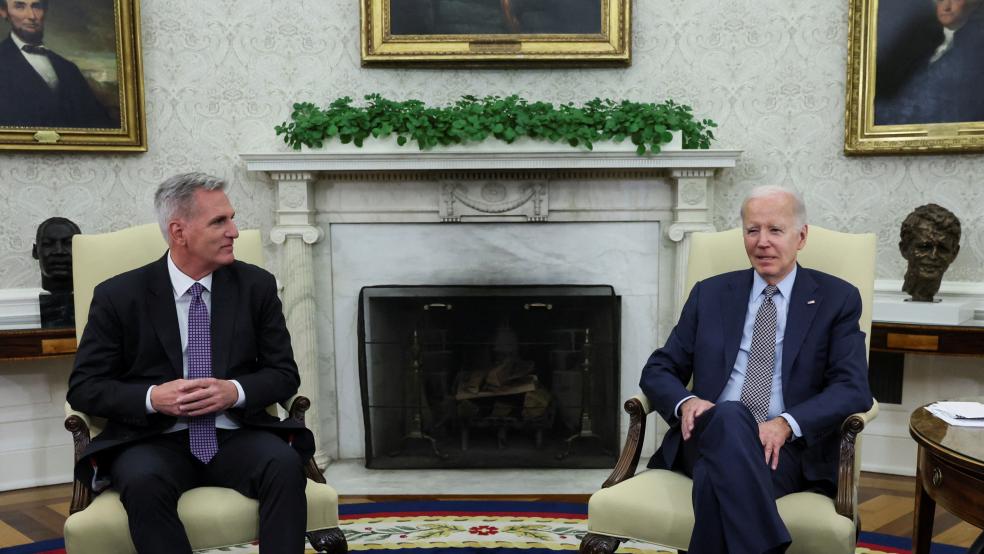With less than 10 days until the U.S. government could roil the global economy by defaulting on its debt, House Speaker Kevin McCarthy emerged from a White House meeting with President Joe Biden Monday evening saying that the discussion was productive and that staff-level talks will continue.
“I felt we had a productive discussion. We don’t have an agreement yet,” McCarthy told reporters after the meeting. He later said that “the tone tonight was better than any other time we’ve had discussions.”
McCarthy said he now expects to talk to Biden daily to try to reach a resolution.
Monday’s meeting comes after bipartisan talks on a budget and debt deal were halted late last week when Republicans walked out of a negotiating session. Biden and McCarthy spoke by phone Sunday to try to reset the stalled discussions. Negotiators then met on Sunday night and convened again on Monday at the Capitol before the two leaders got together at the White House.
Earlier Monday, McCarthy told reporters that he still believes a default can be avoided if a deal can be reached this week.
Major differences on spending and revenues: The two sides reportedly have agreed to limit discretionary spending for at least the next two years, but they remain far apart on the details and whether new revenues should be part of the discussion or not.
“The ongoing disconnect is that House Republicans want to rein in spending by making major spending cuts, which have no hope of passing the Democratic-controlled Senate and are opposed by Biden,” Politico reports.
Republicans are looking to cut discretionary spending to fiscal year 2022 levels, with spending on defense and veterans protected from the axe, forcing steeper cuts to other programs. McCarthy said that cuts to the Pentagon budget were “off the table,” as are tax hikes. He and his team reportedly want new spending caps to last six years, down from an initial demand of 10 years. “What we have to do here is get the spending addiction to stop,” McCarthy told reporters. “We’re going to spend less than we did last year.”
Republican Rep. Patrick McHenry of North Carolina, who attended the White House meeting, laid out the core issue in the talks: “A directive to cut spending year over year is the toughest thing to do in Washington, but that is the speaker’s directive to his negotiating team,” he told reporters.
Democrats have reportedly offered to freeze both defense and non-defense outlays at current levels — which, in Washington accounting terms, would amount to a $90 billion cut relative to expected spending for 2024 and a $1 trillion savings over 10 years.
Biden told reporters Sunday that he had done his part to make some progress in the talks. “We put forward a proposal that cuts spending by more than a trillion dollars, and on top of the nearly $3 trillion in deficit reduction that I previously proposed through the combination of spending cuts and new revenues,” he said at a news conference following the G7 summit in Hiroshima, Japan. “Now it’s time for the other side to move from their extreme positions, because much of what they’ve already proposed is simply, quite frankly, unacceptable.”
Biden insisted that new revenues should be on the table and said he would not agree to a deal that would preserve a $30 billion tax break for the oil industry and risk the Medicaid coverage and food assistance used by millions of Americans. “It’s time for Republicans to accept that there is no bipartisan deal to be made solely, solely on their partisan terms,” he said. “They have to move as well.”
A Republican proposal for stricter work requirements on federal benefit programs reportedly remains a stumbling block as well. Republican negotiators have pushed for work requirements on Medicaid and reportedly also proposed stricter limits on food aid, including a new proposal Friday to limit the ability of states to waive work requirements at times when unemployment spikes.
Biden has rejected work requirements that might cost people their health coverage, but he has indicated that he might be open to new rules for the Temporary Assistance for Needy Families welfare program.
Is the 14th Amendment an option? Each leader faces pressure from their own party. Progressives have urged Biden to invoke the 14th Amendment, which says in part that the validity of the public debt “shall not be questioned.” Biden has indicated that he’s not comfortable with that solution, at least for now, given the legal complexities and court challenges it would likely involve.
He said Sunday that, while he believes he has the authority to invoke the 14th Amendment, it’s not clear whether it could be done in time. “We have not come up with a unilateral action that could succeed in a matter of two weeks or three weeks,” he said, later adding, “But my hope and intention is: When we resolve this problem, I’d find a rationale to take it to the courts to see whether or not the 14th Amendment is, in fact, something that would be able to stop it.”
The bottom line: There’s still no deal.





